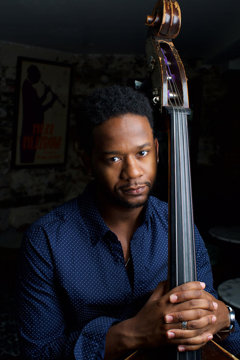“It’s like finding the song inside the song,” Williams said. “You internalize the melody, dig into the core of what the song is about.”
In a homecoming that’s long overdue, Williams, one of the most accomplished graduates of MSU’s jazz program, will bring his stellar band, Sound Effect, to the East Lansing Jazz Festival Friday.
Williams thinks a lot about something pianist Herbie Hancock said to him once: “Music is not about music.” Hancock made the cryptic comment while he and Williams were teaching a master class together in Russia a few years ago.
“It’s a simple phrase, but there’s so much meaning and depth to it,” Williams said. “Every song is like a conversation, and that conversation has a subject.”

Williams isn’t interested in an empty shell game of “composing.” Every bar springs from reflection and emotion.
“I’m at my best as a composer when I’m not composing, you know what I mean?” he said. “Like it’s not coming from me, it’s coming through me and I just have to guide it.”
Since graduating from MSU in 2007, Williams studied at the Juilliard School and became firmly established in the jazz world, playing most recently in guitarist Pat Metheny’s Grammy-winning Unity Band with saxophonist Chris Potter and drummer Antonio Sánchez.
“He’s got a gift,” said Rodney Whitaker, MSU jazz studies director. “He’s only just begun and he’s not doing too bad. I’m proud of him and I think the whole school is.”
Williams grew up loving many styles of music. The recent death of Prince hit him especially hard. As a kid growing up in Washington, D.C., he would go in the basement in the morning before everybody got up, find the VHS of “Purple Rain” and watch it over and over.
“Prince was the reason I wanted to be a musician,” he said. “I loved the way he played guitar. I decided that’s what I wanted to do.”
But fate switched instruments on him. His middle school guitar class was full, so he ended up playing bass.
He was already a top student at D.C.’s Duke Ellington School of the Arts and gigging around town when Whitaker recruited him to East Lansing.
“Rodney was almost like a father, as well as a professor,” Williams said. “I learned so much from him musically and personally, as a man.”
Williams and Whitaker found they shared the same heroes, including Detroit jazz bassist Paul Chambers. Both of them also grew up playing different styles of music. Williams evolved into a 21st century, iPod-era musician, seamlessly blending R&B, classical styles, hip-hop and rock into his jazz sensibility.
“D.C.’s U Street Corridor was full of clubs and bars with live music of all kinds,” Williams said. “We all mixed and mingled. I bring all that with me to my music to this day.”
Last year, Williams had fun making a brief appearance in Don Cheadle's 2016 Miles Davis biopic, “Miles Ahead.” A high school friend of Williams was helping Cheadle cast the film and suggested Williams appear briefly as a bassist.
With its non-linear structure, fantasies and fabrications, the movie has been controversial with purists, but Williams admired Cheadle's passion for the project and its iconoclastic spirit.
“He did a Miles Davis thing with the Miles Davis movie,” Williams said.
With two CDs of his own under his belt, Williams is ready to branch out into other media. Last week, he released “Toy Soldiers,” a video of a song from his latest album, “Coming of Age,” about a soldier suffering from PTSD.
In the video, Williams’ elegaic ballad-march is punctuated with sudden silences and shrapnel-like slivers of war imagery, with a reflective rap conclusion. It’s a stretch for Williams, and a perfect example of music that “is not about music.”
Ben Williams
7:30 p.m. Friday, June 17 Main stage
Support City Pulse - Donate Today!
Comments
No comments on this item Please log in to comment by clicking here